Suicide
Guess the genuine suicide notes
The 1957 book Clues to Suicide, edited by Edwin Shneidman and Norman Farberow, contains an unusual quiz in the appendix. It presents the reader with 33 pairs of suicide notes. In each pair one of the notes is genuine and one is "simulated." The reader is challenged to guess which is which.The genuine notes were all obtained from the Los Angeles County Coroner's Office. The simulated notes were obtained from "nonsuicidal individuals contacted in labor unions, fraternal groups, and the general community." The individuals were told that by writing the notes they were helping with a scientific study on suicide prevention.
Furthermore, all the note writers (of both the genuine and simulated notes) were "male, Caucasian, Protestant, native-born, and between the ages of twenty-five and fifty-nine."
The authors suggest taking the quiz before reading their book (but not looking at the answers), and then re-taking the quiz after reading it in order to determine if the book has provided "greater perspicacity."
I've pasted three sample pairs below, but I also made a pdf of the entire quiz (with the answer key at the end).
Or you can find the quiz in the book itself which is available to read at the Internet Archive.



More in extended >>
Posted By: Alex - Fri May 24, 2024 -
Comments (2)
Category: Death, Suicide, Quizzes
Bridge Color and Suicide
There's a popular hypothesis that the color of a bridge can influence how many people commit suicide from it. Dark bridges are said to attract more jumpers than brightly colored ones.The most widely cited example of this effect is Blackfriars Bridge in London. It originally was black, but in 1928 it was repainted green with yellow trim. In fact, it was repainted with the specific intention of reducing suicide attempts. And sure enough, the suicide rate reportedly dropped by 30%. (More info: "The influence of color," Penn State)
Blackfriars Bridge is no longer green, but it's still brightly painted (red and white). I can't find info on how many people still jump from it. So I don't know if the color effect is still working.
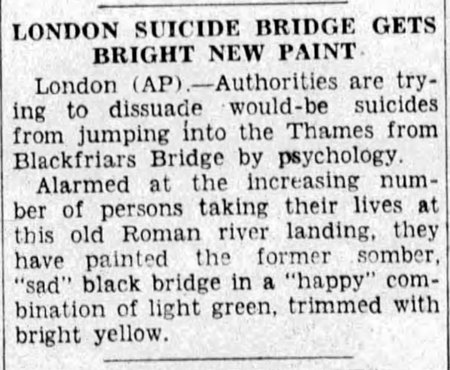
Yonkers Herald Statesman - Sep 15, 1928
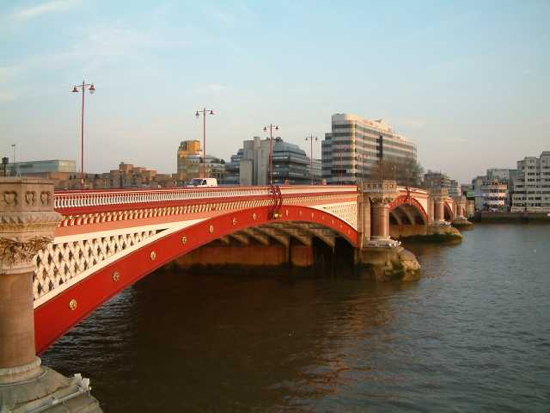
Blackfriars Bridge (source: wikipedia)
Another example is the Clifton Suspension Bridge near Bristol, England. In 1957 its color was changed from dark red to a light silver-gray — again with the specific hope of deterring suicide jumpers. Unfortunately I can't find any follow-up data to know if the color change worked.
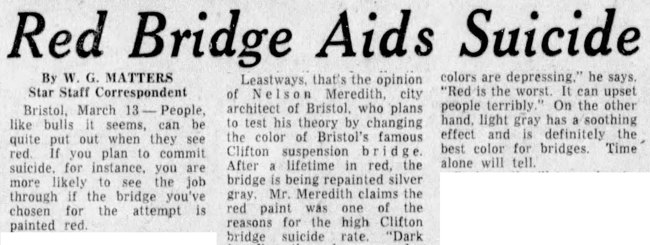
Toronto Daily Star - Mar 13, 1957

Clifton Suspension Bridge (source: wikipedia)
The connection between bridge color and suicide seems a bit dubious to me. It would be nice if there was more substantial data to back up the hypothesis.
Posted By: Alex - Fri Nov 03, 2023 -
Comments (3)
Category: Architecture, Suicide
Death by metric system
1976: Leonard Dodge "hung himself — because he could not cope with the change-over to metrication, it was suggested at the inquest on him."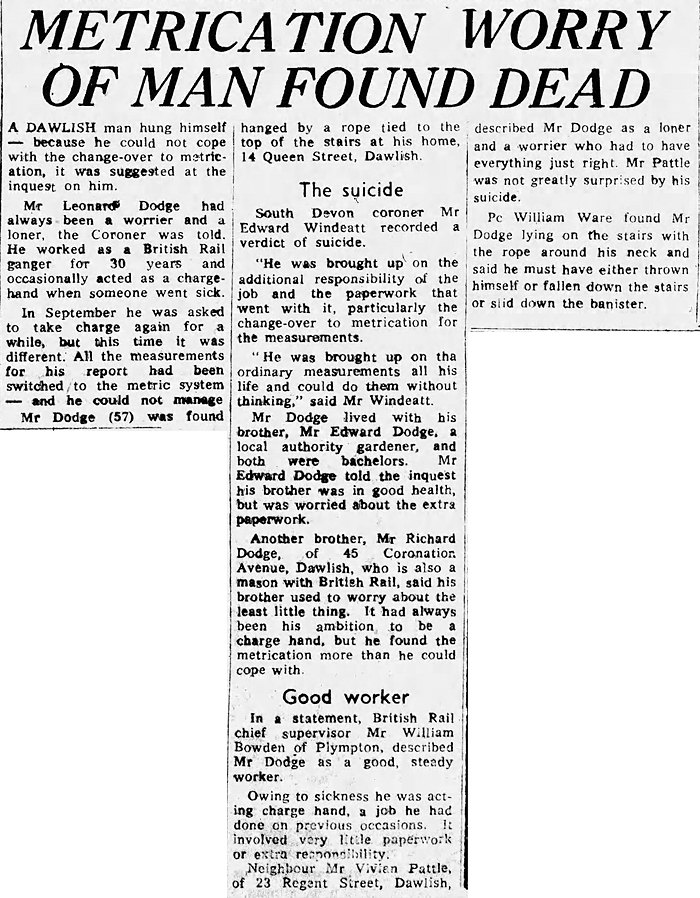
Devon Herald Express - Oct 9, 1976
Posted By: Alex - Thu Apr 20, 2023 -
Comments (1)
Category: Death, Suicide, 1970s
Failed Suicide Champion

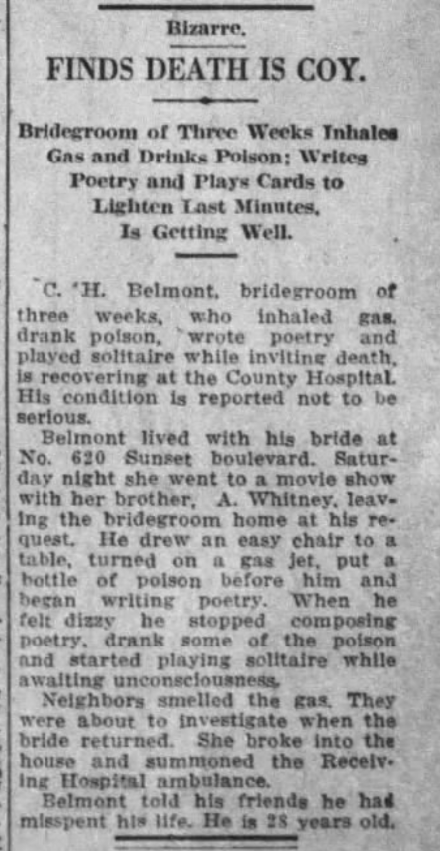
Posted By: Paul - Wed Oct 12, 2022 -
Comments (0)
Category: Success & Failure, Suicide, 1910s
Suicide with sock
This sounds like a particularly unpleasant way to end one's life.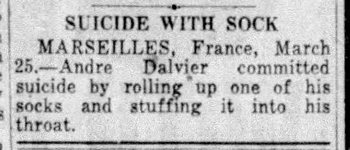
Dayton Daily News - Mar 25, 1932
Posted By: Alex - Sat Mar 12, 2022 -
Comments (1)
Category: Suicide, 1930s
Surviving a fall from the Empire State Building
Two people have jumped from the observation deck of the Empire State Building, intending to commit suicide, and survived.The first was Thomas Helms, a 27-year-old artist from Hawaii. He jumped on Dec 22, 1977, but the winds blew him onto a ledge 15-feet below. After lying stunned for a while, he managed to crawl back inside through a window.
The second survivor was Elvita Adams of New York City. She jumped on Dec 2, 1979, but again the wind blew her back toward the building, depositing her on a balcony on the 85th floor. A security guard noticed her there and pulled her back inside.
For whatever reason, the case of Elvita Adams attracted more attention. It inspired an off-Broadway one-man show, "I've Been Elvita Adams," which didn't get good reviews.
Based on these two cases, windy days in December would seem to be the best days for surviving a jump from the Empire State Building.
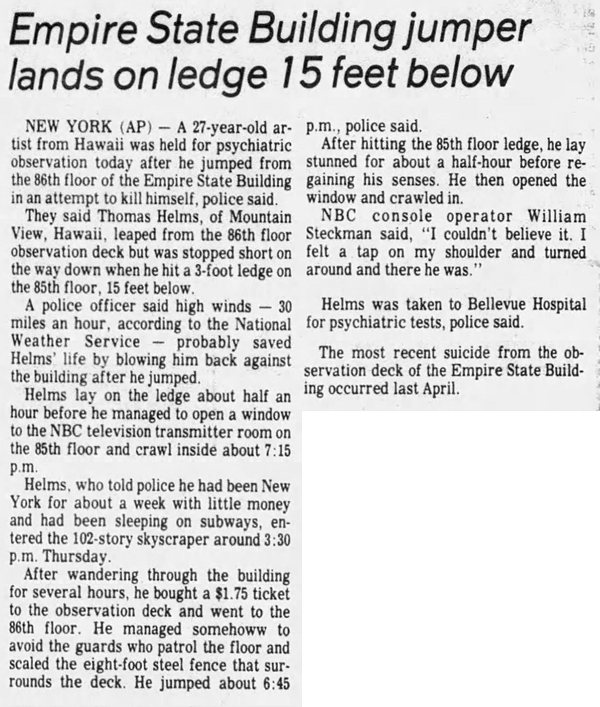
Bridgewater Courier-News - Dec 23, 1977
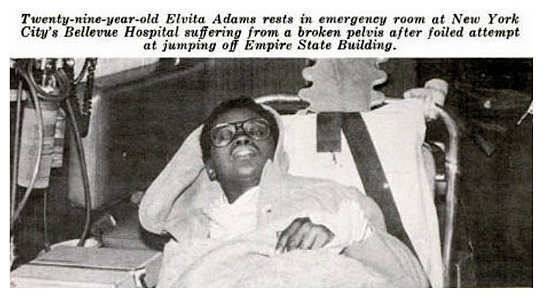
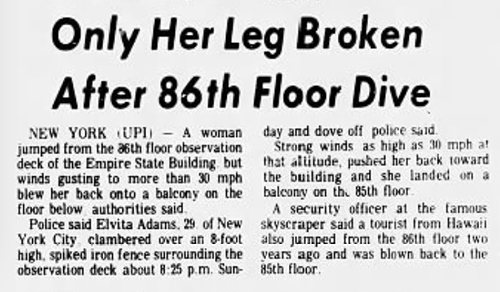
Provo Daily Herald - Dec 3, 1979
Posted By: Alex - Tue Feb 01, 2022 -
Comments (4)
Category: Death, Suicide, 1970s
Unlikely Reasons for Murder No. 5
Suicide is self-murder, and offing oneself because your murderous insurance scam has come unraveled seems a bit more unlikely than accepting the punishment. Extra points given for swallowing poison in front of the cops. How did he have it so handy?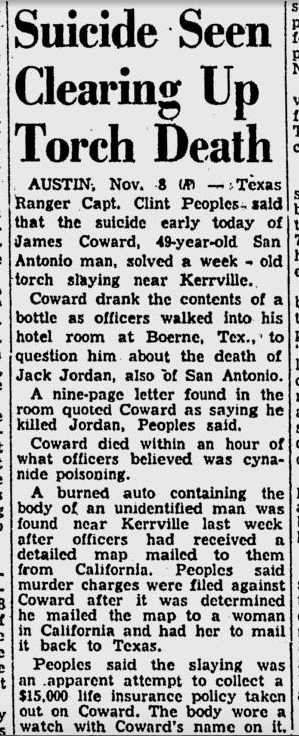
Source: The Daily Journal (Commerce, Texas) 09 Nov 1956, Fri Page 1
Posted By: Paul - Thu Aug 19, 2021 -
Comments (5)
Category: Death, Suicide, Scams, Cons, Rip-offs, and General Larceny, Stupid Criminals, 1950s
Twin Suicide by Starvation
One hardly knows where to begin to calculate the weirdness quotient in this small article.Source: Evening Star (Washington, District of Columbia) 23 Jun 1925, Tue Page 1
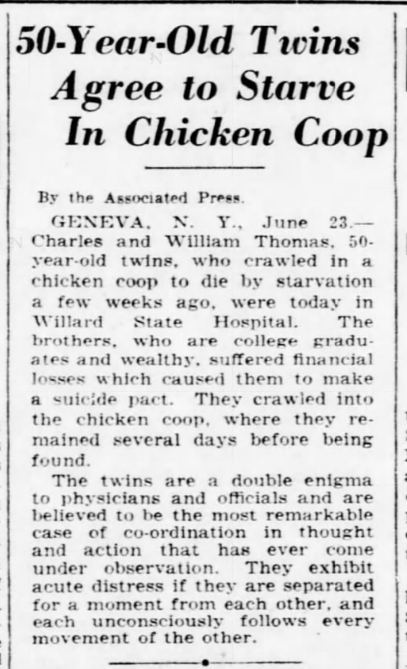
Posted By: Paul - Sun Aug 01, 2021 -
Comments (1)
Category: Family, Human Marvels, Suicide, 1920s
Death by playing cards
Oct 20, 1930: Convict William Kogut, who was waiting execution on San Quentin's death row, somehow knew that it was possible to make a bomb out of playing cards. This was because, at the time, the red ink of cards contained nitrocellulose. So by scraping off enough of the red ink, Kogut was able to make a pipe bomb out of a hollow bedpost. He used this to kill himself, rather than letting himself be executed.Modern playing cards no longer contain this explosive ingredient.
Somewhat confusingly, Snopes classifies his death as a "legend," even though their brief write-up seems to confirm that it happened exactly as described.
More info: theatrefx.com
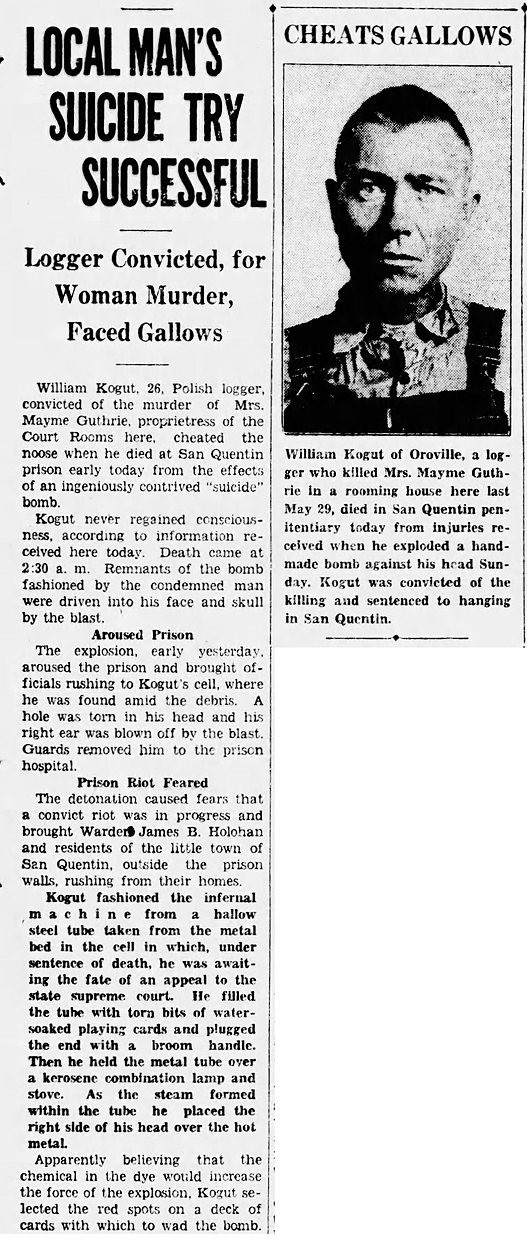
Oroville Mercury Register - Oct 20, 1930
Posted By: Alex - Wed Jun 23, 2021 -
Comments (3)
Category: Death, Suicide, Prisons, 1930s
Anti-Suicide Nasal Spray
Back in 2012, the Army awarded a grant to Dr. Michael Kubek of the Indiana University School of Medicine to develop an "anti-suicide nasal spray". TheMarySue.com gives some details:The Military Suicide Research Consortium offers some more info, similarly emphasizing that a primary benefit of the nasal spray was that it would be quick-acting. So I'm assuming the idea was that if someone was thinking about suicide, they could squirt the spray up their nose and the thoughts would go away. Although this suggests a problem. If someone was serious about suicide, wouldn't they purposefully not use the nasal spray?
The Army grant was for three years. But I can't find any follow-up indicating whether the spray was successfully developed. Although I did find that Dr. Kubek died in 2019.
Posted By: Alex - Tue Jan 05, 2021 -
Comments (3)
Category: Medicine, Suicide

| Who We Are |
|---|
| Alex Boese Alex is the creator and curator of the Museum of Hoaxes. He's also the author of various weird, non-fiction, science-themed books such as Elephants on Acid and Psychedelic Apes. Paul Di Filippo Paul has been paid to put weird ideas into fictional form for over thirty years, in his career as a noted science fiction writer. He has recently begun blogging on many curious topics with three fellow writers at The Inferior 4+1. Contact Us |




